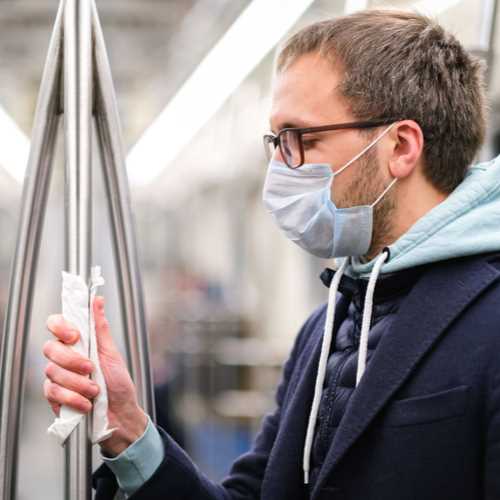28 May 2020
 What’s the future for public transport and other commuting options for people in a COVID-19 world, where the fear of spreading germs or contracting the virus has heightened anxiety?
What’s the future for public transport and other commuting options for people in a COVID-19 world, where the fear of spreading germs or contracting the virus has heightened anxiety?
Mandatory masks and gloves on buses, trams and trains could become the norm in Australia as the country slowly eases its restrictions and returns to normality, according to University of South Australia urban planning expert Dr Andrew Allan.
Dr Allan says because social distancing on public transport is impractical, mandating the use of face masks and plastic gloves could help minimise the risk.
“Once people start returning to their workplace, many won’t have a choice but to use public transport if they can’t afford parking or if it’s not provided by their workplace,” Dr Allan says.
A small percentage of commuters who live close to the city may switch to cycling or walking to walk, but Dr Allan predicts many people in the middle and outer suburbs will opt for cars over public transport in future.
“I expect we will see a reduction in peak travel demand, purely due to some people electing to work from home either part time or permanently, and many employers agreeing to flexible working times,” he says.
“Sadly, some people don’t have jobs to return to, or face a reduction in working hours, and this could easily account for a 15-20 per cent reduction in travel demand.”.
Dr Allan says employers and shopping centres will need to provide more bicycle parking and the State Government will have to expand its cycling and walking paths as more people choose these options over public transport.
“The worry over the longer term, is that people will become more dependent on cars,” he says. “Motor vehicle emissions exacerbate global warming and governments will need to withstand public pressure to provide more car parks if we are serious in tackling carbon emissions.
“Instead, the focus should be on bolstering public transport and improving the infrastructure for cycling and walking.”
Dr Li Meng, a UniSA transport engineer, says road safety and convenience will influence whether people adopt cycling as their preferred commuting option.
“During this lockdown period, a lot of people have taken up cycling and found it enjoyable and beneficial, but if cycling routes are not safe and if their employer doesn’t provide bicycle parking and showers, they won’t stick to it once they return to work,” Dr Meng says.
Car-pooling may become more popular as some people shy away from public transport, she predicts, and Uber and E-scooters may also be a viable option if the hygiene concerns can be addressed and they widen their availability beyond inner city areas.
Dr Meng advocates cycling and pedestrian-only traffic corridors in Adelaide, coupled with a reduction in speed limits in the CBD, to encourage people to leave their cars at home.
Public transport planner, UniSA civil engineer Dr Sekhar Somenahalli, says Australia has an opportunity to capitalise on the environmental benefits that COVID-19 has delivered.
“Cleaner air and lower carbon emissions as a result of a drastic fall in cars on our roads have been welcomed by everybody,” he says.
“Some cities around the world have already adopted measures such as creating new bike lanes and closing some streets to vehicle traffic to encourage people to walk, cycle and jog.
“The need for physical distancing strengthens the argument for permanent changes in the way that we travel. This pandemic has had terrible health and economic consequences, but also some unexpected benefits and the environment is just one winner,” he says.
Media contact: Candy Gibson office +61 8 8302 0961 mobile: +61 434 605 142
email: candy.gibson@unisa.edu.au;
Dr Andrew Allan: office +61 8 8302 1476 email: andrew.allan@unisa.edu.au
Dr Li Meng: office +61 8 8302 3223 email: li.meng@unisa.edu.au
Dr Sekhar Somenahalli: office +61 8 8302 1855 email: sekhar.somenahalli@unisa.edu.au




